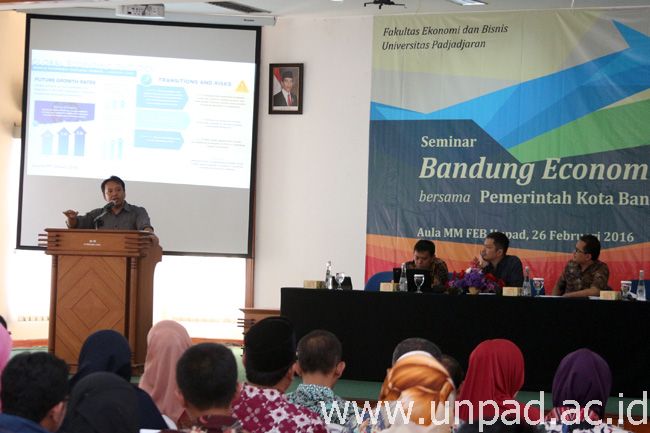[Unpad.ac.id, 26/02/2016] Academics of Universitas Padjadjaran contributed ideas for the city of Bandung. The purpose of the seminar is for the city, which is currently led by Mayor Ridwan Kamil and Deputy Mayor Oded M. Danial, could advance further, especially in terms of improving people’s welfare.

Arief Anshory Yusuf, S.E., M.Sc., PhD, Lecturer of Faculty of Economics and Business Unpad argued that future Bandung economic growth would be relatively high. Yet with the increase, the trend of poverty and inequality are also become greater, due to the uneven impact of economic improvement in the community.
“It is a challenge to have economy equality,” said Arief as a speaker in the seminar on “Bandung Economic Outlook with Bandung Municipal Government” at The Hall of Gedung Magister Manajemen Unpad, Friday (26/02).
Besides Arief, this FEB seminar also featured Dr. Bagdja Muljarijadi, S.T., S.E., M.S., (Lecturer of FEB Unpad), Irlandia Ginandjar, S.Si., M.Si., (Lecturer of Program Study Statistics of FMIPA Unpad), and Kamalia Purbani (Head of Regional Government Agency Bandung). Also among the attendance were Bandung Mayor Ridwan Kamil.
In the presence of the Mayor, Arief invited the government to shift current paradigm into prioritizing justice for growth promotion. Prioritization of justice would expand the equal opportunity within society, especially in the fields of education and health.
These two aspects, this expert Economic Development, would produce excellent human resources who were able to innovate which in extension would increase productivity and economic growth.
Arief also highlighted the importance of realizing Kartu Bandung Juara (Bandung Card) program for equal opportunity of education access. Similar with Jakarta Smart Card (KJP), the program also had the potential to reduce the inequality/poverty significantly.
“One of the function of the card was to cover lack of educational assistance (BSM, BOS) that had insufficient funding and missed target range receiver. Besides dedicated to education, this card could also be used to support equal opportunities of business and financial inclusion, “he said.
Meanwhile, Irlandia presented a few suggestions for the Municipal Government. These suggestions were based on a survey of people in Bandung in relation to performance satisfaction of City Government that was conducted in November 2015.
In the survey, Irlandia focused on 4 area of Bandung: Area I (North and South Bandung area), Area II (Central Bandung), Area III (East Bandung), and Area IV (West Bandung).
“There are improvements variations in every area so that on going treatment would be fit better for each area,” said Irlandia.
In Area I, the focus of the improvements was the flood management, street vendors, and the bureaucracy time of government services. Area II focused on waste management and management of traditional markets. Area III focused on public transport services, availability of clean water, availability of parking, health care, and health workers. While area IV was focused on improving congestion.
Responding to numerous inputs, Emil, Ridwan Kamil’s nickname, encouraged Unpad to produce life changing policy through its existing variety of knowledge.
“Hopefully with these recommendations, we could raise our competitiveness and lower our Gini Ratio (a measure of inequality),” he said.*
Reported by Arief Maulana / eh

